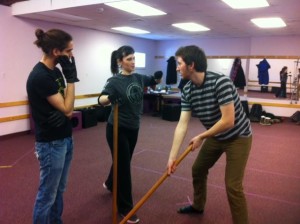One of the big challenges that we grad students (particularly non-resident grad students caught somewhere between late dissertation writing and the job market) face is isolation. Going from a structured schedule that involves a highly-social job (teaching and or learning) to sitting at home alone with your research every day can be extremely challenging. If you’re not the type of person that deals well with large tasks to perform in unstructured time, then you’ll face even worse troubles at this stage of the game (and frankly it’s a miracle you got this far). I’m not going to say that I’ve solved the many problems of academic isolation, they are definitely demons I face every day, but I’m coping and I certainly put a lot of thought into how to cope with these issues. Here are a few of my better brainwaves for methods I use to help deal with academic isolation.

Sometimes my job looks like this; a day of FD work on Tufts University’s “Richard III”
Get a Job
I’ve tried to keep a hand in teaching as much as I can, even when that means taking on alternative teaching jobs. I spent a few years teaching continuing adult education which was extremely rewarding and gave me somewhere to be once a week to make human eye contact and discuss things I was passionate about with other people. Though this program didn’t pay “the big bucks”, it was a worthwhile use of my time in that it got me out of the house, gave me a forum in which to try out new teaching materials, and gave me teaching experience that I might otherwise not have had the opportunity to acquire. But even when there are no teaching jobs available (this happens sometimes and it’s not your fault), consider taking on a very part-time, very temporary position somewhere near your beaten path. A few hours of responsibility, social activity, and paid work every week can do wonders for your self-esteem at this highly volatile time. Finding the right fit for this can sometimes be challenging, but think about things you’d actually like to do and see if you can’t monetize them. Remember: not every job you work has to go on your resume and you never know when you’ll meet someone who may just be a useful connection for your true professional calling.
Reach Out
I am not a highly social creature during the best of times, and my social energies get sapped very quickly when I’m under a lot of stress. What this has generally meant is that the dissertation process has made me not just an academic hermit, but a social hermit as well. At the end of the day, the last thing I tend to want to do is go out and be social. Despite this, I try to make an extra effort to see people who I know will 1) understand the process I’m going through, and 2) put positive energy back into my bucket. There are a few friends I have who I know are low-key to be around, will support me if I’m feeling not so great about my work life, and will understand if I just don’t want to talk about much of anything. Being around these people as much as possible (which, let’s face it, is not much when you have a demanding professional schedule) is important to keeping the lonelies at bay. I’m often pleasantly surprised at what an evening in the right company can do for my mood; and my mood in turn effects my productivity. In short: the right amount of time with the right people will help you be a better writer.

Museums can be a cheap way of getting out and staying mentally in the game. This is me an P.T. Barnum (i.e.: My chapter 4) at the National Portrait Gallery in DC
Vitamin D
Sometimes, just leaving my house to go for a walk can help to improve a dismal mood brought on by dissertation-related isolation. Fresh air and sunshine are mood-lifters, and endorphins will give you an extra kick to boot. If you’ve been keeping up with Dani Dash, you know that I tend to go running rather than walking these days, but whatever your speed taking a break outside is definitely worth your while.
Have a (Small) Treat
While we grad students live on a notoriously tight budget, now and again a special treat can help you support yourself. Sometimes, this treat can be productivity related; if I’m stuck in the “I don’t wanna” phase of editing, I’ll take my draft to a favorite coffee shop and grab myself a drink (I almost never buy coffee, so this is a great little treat). Sometimes, it can be self-care related; if I’m feeling extremely stressed or strung out, I’ll find a groupon for a massage and take an hour just to refuel and unwind. The pitfall here is obvious: too much of a good thing can break your budget and self-reward structure. Just be careful about how frequently (and how much) you are treating yourself; but don’t feel guilty when you do on occasion (especially if you plan and budget for this). You are worth it.
Remind yourself Why
This one is the biggest challenge. Facing down today’s job market, it can be difficult to remember why we’re doing what we’re doing in the first place. If you can find any way to remind yourself, any trigger to reinvigorate the passion which led you down the road you’re traveling, revisit it as frequently as you need. Often I get so caught up in the writing portion of dissertating that I can’t see the forest for the trees; it’s in these moments that I need to go see a show, or look at old journal entries, or re-read particularly glowing course evals from former students. Find a touchstone that will help key you in to what you love about the work and never let it go. I’m not saying you need to moon like an adolescent love poem, but without taking the time to reinvigorate your passion now and again you’ll slide into the doldrums of the grind and that is soul crushing. Fortify with frequent doses of vitamin L(ove) and try to ignore the vampiric voice of futility.
Get Help
I know many people (myself included) who are likely to thank their therapists in their dissertation acknowledgements. If you’re feeling stuck, depressed, or just unable to shake your mood, there is no shame in seeking professional help. The right person will be able to talk you through your troubles and inject some new light on the subject. If your issues seem to be mostly grad-school related, I highly recommend seeking out a therapist with a PsyD. Since this person has been through the process of getting a Doctorate, they are much more likely to understand your journey and be able to offer insight without you having to explain every step of the way. They have first hand experience with the stakes and stresses of exams, research, advisors, and the myriad of other field-specific stressors that academic life entails.
Whatever you do, don’t let isolation impede your progress. Breaking the cycle is a pivotal piece of “getting it done” (which, at the end of the day, is really what you need to do).

